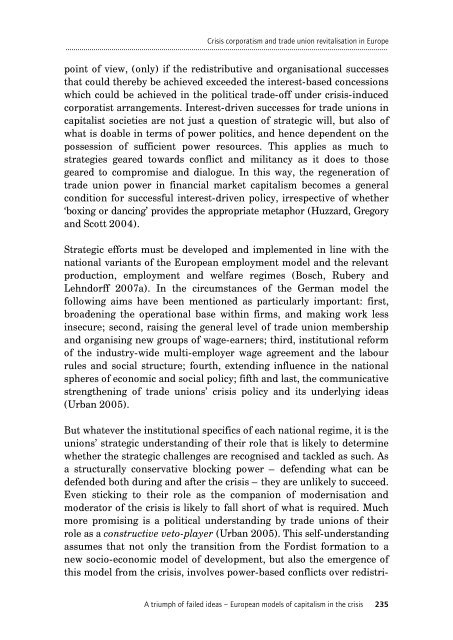A triumph of failed ideas European models of capitalism in ... - Journal
A triumph of failed ideas European models of capitalism in ... - Journal
A triumph of failed ideas European models of capitalism in ... - Journal
You also want an ePaper? Increase the reach of your titles
YUMPU automatically turns print PDFs into web optimized ePapers that Google loves.
Crisis corporatism and trade union revitalisation <strong>in</strong> Europe.................................................................................................................................................................po<strong>in</strong>t <strong>of</strong> view, (only) if the redistributive and organisational successesthat could thereby be achieved exceeded the <strong>in</strong>terest-based concessionswhich could be achieved <strong>in</strong> the political trade-<strong>of</strong>f under crisis-<strong>in</strong>ducedcorporatist arrangements. Interest-driven successes for trade unions <strong>in</strong>capitalist societies are not just a question <strong>of</strong> strategic will, but also <strong>of</strong>what is doable <strong>in</strong> terms <strong>of</strong> power politics, and hence dependent on thepossession <strong>of</strong> sufficient power resources. This applies as much tostrategies geared towards conflict and militancy as it does to thosegeared to compromise and dialogue. In this way, the regeneration <strong>of</strong>trade union power <strong>in</strong> f<strong>in</strong>ancial market <strong>capitalism</strong> becomes a generalcondition for successful <strong>in</strong>terest-driven policy, irrespective <strong>of</strong> whether‘box<strong>in</strong>g or danc<strong>in</strong>g’ provides the appropriate metaphor (Huzzard, Gregoryand Scott 2004).Strategic efforts must be developed and implemented <strong>in</strong> l<strong>in</strong>e with thenational variants <strong>of</strong> the <strong>European</strong> employment model and the relevantproduction, employment and welfare regimes (Bosch, Rubery andLehndorff 2007a). In the circumstances <strong>of</strong> the German model thefollow<strong>in</strong>g aims have been mentioned as particularly important: first,broaden<strong>in</strong>g the operational base with<strong>in</strong> firms, and mak<strong>in</strong>g work less<strong>in</strong>secure; second, rais<strong>in</strong>g the general level <strong>of</strong> trade union membershipand organis<strong>in</strong>g new groups <strong>of</strong> wage-earners; third, <strong>in</strong>stitutional reform<strong>of</strong> the <strong>in</strong>dustry-wide multi-employer wage agreement and the labourrules and social structure; fourth, extend<strong>in</strong>g <strong>in</strong>fluence <strong>in</strong> the nationalspheres <strong>of</strong> economic and social policy; fifth and last, the communicativestrengthen<strong>in</strong>g <strong>of</strong> trade unions’ crisis policy and its underly<strong>in</strong>g <strong>ideas</strong>(Urban 2005).But whatever the <strong>in</strong>stitutional specifics <strong>of</strong> each national regime, it is theunions’ strategic understand<strong>in</strong>g <strong>of</strong> their role that is likely to determ<strong>in</strong>ewhether the strategic challenges are recognised and tackled as such. Asa structurally conservative block<strong>in</strong>g power – defend<strong>in</strong>g what can bedefended both dur<strong>in</strong>g and after the crisis – they are unlikely to succeed.Even stick<strong>in</strong>g to their role as the companion <strong>of</strong> modernisation andmoderator <strong>of</strong> the crisis is likely to fall short <strong>of</strong> what is required. Muchmore promis<strong>in</strong>g is a political understand<strong>in</strong>g by trade unions <strong>of</strong> theirrole as a constructive veto-player (Urban 2005). This self-understand<strong>in</strong>gassumes that not only the transition from the Fordist formation to anew socio-economic model <strong>of</strong> development, but also the emergence <strong>of</strong>this model from the crisis, <strong>in</strong>volves power-based conflicts over redistri-A <strong>triumph</strong> <strong>of</strong> <strong>failed</strong> <strong>ideas</strong> – <strong>European</strong> <strong>models</strong> <strong>of</strong> <strong>capitalism</strong> <strong>in</strong> the crisis 235








